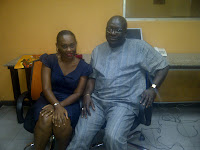In his wildest imagination, he never believed he could be a university graduate, let alone a vice-chancellor. But Prof. Debo Adeyewa is now the Vice-Chancellor, Redeemer’s University, Mowe, Ogun State.
From being a pupil in a quranic school, to an apprentice carpenter and a bread seller on the streets of Jos, the Inisa, Odo-Otin Local Government Area of Osun State-born Adeyewa endured poverty and deprivation to seek education.
“I was born in 1957. That was the year the first satellite was sent to space. We were so poor that my father had to work as a labourer on another man’s farm before we could eat. It was that bad.
“One day, my uncle, who was a carpenter, came from Jos. When he was going back, I followed him to learn the work of a carpenter. In Jos, I was learning this and at the same time selling bread for people to raise money to feed. We later moved to Yauri, in present Kebbi State, where I continued the trade, helping women to sell bread,” he recalls.
At Yauri, he attended a technical college between 1978 and 1980. After the completion of the technical college, he sat for the then General Certificate of Education examination. His result was good enough to secure admission for him to the University of Ife, (now Obafemi Awolowo University), Ile-Ife, Osun State.
With a collaboration between OAU and Meteorology University, Uppsala, Sweden, Adeyewa obtained a PhD degree in satellite meteorology.
“The story of my life, so far, has taught me never to look down on anybody and to know that without God, I cannot do anything. My advice to ‘helpless’ youths is to know that things are better now than they were before now. They should find opportunities. I found opportunities in selling bread, though it was not easy. I looked at my life as an investment. So, they should look at theirs like that too.
“They should believe in God and in themselves. They should be disciplined, should have integrity, pursue excellence, embrace team work and always be ready to offer service to anybody that needs their services, Adeyewa adds.
LC: Inspirational isn't it? Yes, we should encourage our youth to have integrity, embrace team work and to be caring! How do we do this? The period of developing the spirit of cooperation and communication is best harnessed at the early childhood education stage which the government has left in the hands of the private sector with minuscule supervision if any. We are yet to hand down decent education to the millions of students around our public schools. I hate to say that using what is obtainable at the private schools to judge the level of our academia, is like comparing the lifestyle of our public office holders to the well being of the populace.
Additionally, we may want to scratch the part that says that, things are better now than they were before! We know they are not! The educational opportunities that presented at that time are not obtainable in the same way; there are much more people applying for so little opportunities. The Universal Basic Education (UBE) has a great framework upon which his positions should thrive but it seems as though we have become experts at botching implementation of policies.
Finally, I believe that against all odds, one who has opportunities presented their way merged with a natural knack for learning could certainly make a good career as he did. We are a 'certificate driven' nation and until those who are responsible for implementation of the current UBE program become 'born again' or 'radicalized', it may be a tough call to realize the good Professor's hopes.
So, I encourage everyone who has to struggle through to school to keep at it. Prof. Adeyewa is an 'OUTLIER'; pure and simple! To the positive mind, much availeth!












